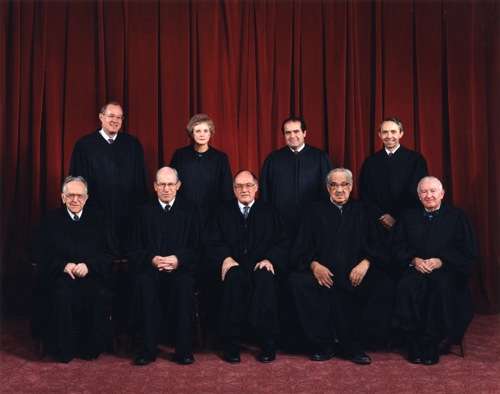The Volokh Conspiracy
Mostly law professors | Sometimes contrarian | Often libertarian | Always independent
Today in Supreme Court History: May 23, 1991
5/23/1991: Rust v. Sullivan is decided.

Editor's Note: We invite comments and request that they be civil and on-topic. We do not moderate or assume any responsibility for comments, which are owned by the readers who post them. Comments do not represent the views of Reason.com or Reason Foundation. We reserve the right to delete any comment for any reason at any time. Comments may only be edited within 5 minutes of posting. Report abuses.
Please to post comments


These entries are coming in late and being inserted at the right time. Along with Dan not being here, this feels like the final days of a TV show, with a change in time slot and other irregular programming.
This case arose from a dispute partially involving the Bronx. To quote the district court:
Plaintiff Dr. Irving Rust, an obstetrician and gynecologist, is the Medical Director of the Bronx Center, a facility of plaintiff Planned Parenthood of New York City, Inc. ("PPNYC"), and plaintiff Dr. Melvin Padawer is the Medical Director of plaintiff Planned Parenthood of Westchester/Rockland ("PPWR"). As such, each supervises a Title X funded health care program.
It involved government funding of health clinics and an executive policy that prohibited talking about abortion.
It is an early example of Justice Souter joining a conservative result. I am not sure if he would have joined the majority later on. His votes in certain cases make me doubtful. The case turned on his vote -- Brennan retired the previous term.
Wikipedia notes Congress tried to repeal the policy by statute, but Bush 41 vetoed it. This is a possible flaw in the current system where an executive can, perhaps dubiously (especially if you believe four members of the Supreme Court), apply a statute, and it takes a supermajority to override the result.
Clinton changed the policy. A usual switch took place depending on the president's party regarding federal governmental reproductive health funding. I have long felt that the discretion of the president to do this is somewhat irregular. It seems a policy choice that should be in place because of legislative action.
Still, it shows the power of the executive to set policy within the grounds of broad statutory discretion. The president's power to set the policy applied here, changing what was the policy in place, was upheld 5-4.